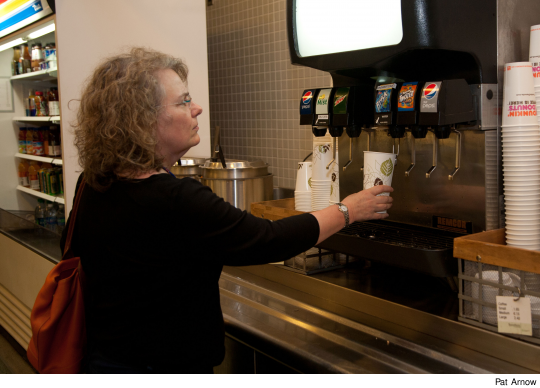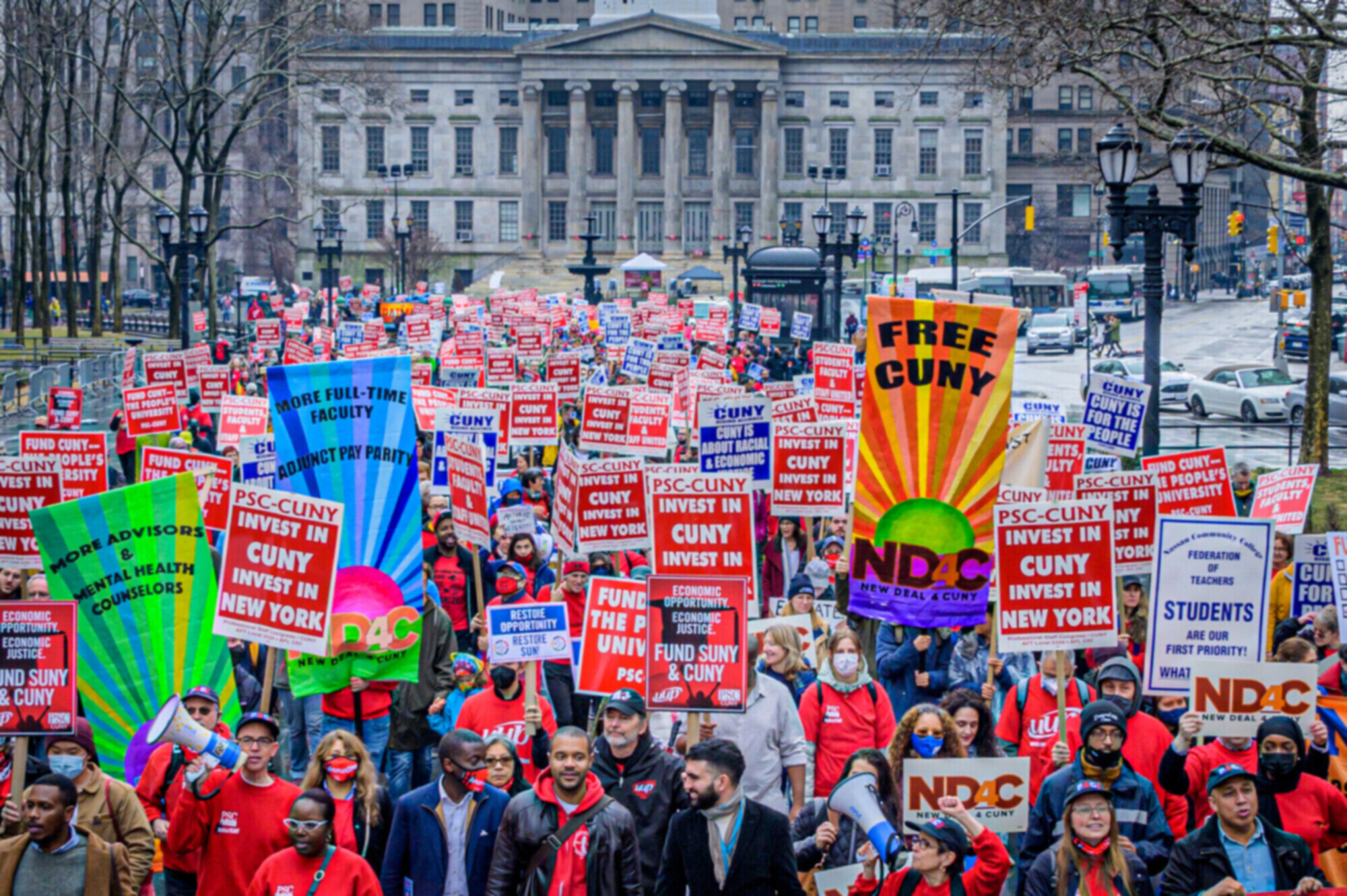Last June 2012, the CUNY Board of Trustees voted to offer the exclusive right to sell soft drinks, bottled water and other beverages “to a single manufacturer for the University as a whole.” Proposals will be considered for either cafeteria sales alone, or both cafeteria and vending machine sales together. The trustees pledged that a University-wide vendor will be chosen only if this would lead to “higher revenues for each of the colleges and the Central Office” than the current system of college-level beverage contracts. Proposals are due November 1, 2012.
 |
LABOR RIGHTS
Companies expected to submit proposals include Coca-Cola, a student with knowledge of the process told Clarion. Though the trustees’ resolution stipulates that the chosen company should be a “responsive and responsible offeror,” Coca-Cola has faced widespread criticism for its labor rights record, particularly at its bottling plants in Colombia.
“All respondents to the request for proposals must enforce fair labor practices in the United States and abroad with respect to its employees and those of its bottlers, distributors and other contractors,” CUNY spokesperson Rita Rodin told Clarion. “The proposals must include evidence of these practices.” If so, labor advocates say, any proposal from Coca-Cola should be rejected.
COLOMBIA
About five dozen universities around the country, including Rutgers, University of California-Berkeley, and Manhattanville College, have stopped doing business with Coca-Cola due to concerns over the company’s record on labor rights, both in the US and abroad.
CUNY’s University Student Senate voted in 2006 to support a ban on Coca-Cola sales in the University system, citing human rights abuses aimed at union workers – including the use of paramilitary security forces who tortured and killed union activists – at Coca-Cola’s bottling plants in Colombia.
Three CUNY campuses have in fact dropped Coca-Cola due to labor rights concerns. Students organizing with the Campaign to Stop Killer Coke, a group of labor rights advocates, helped push the beverage giant out of Queensborough Community College, the Joseph Murphy Institute, and the CUNY School of Law.
“The evidence out there suggests that Coca-Cola’s been complicit in the hiring of paramilitaries to murder union members on bottling plant floors in Colombia,” said Dan Monahan, a CUNY Law School graduate who was involved in the successful effort to stop selling Coke products there. “CUNY should be a socially responsible organization,” he told Clarion. “It shouldn’t just do whatever’s cheapest, to make a buck. In all aspects they should be socially responsible.” It was a message to which the Law School community was receptive, added Monahan, who is now a legal aid attorney in Texas: “It’s a public interest law school, so there’s a good group of public-interest-minded students and faculty” concerned about labor rights issues.
In 2004, Coca-Cola’s practices in Colombia were investigated by a fact-finding delegation from New York, which included representatives of the PSC, Communications Workers of America Local 1180, the Civil Service Employees Association, United Students Against Sweatshops and a member of the City Council. The delegation’s report concluded that Coca-Cola is “complicit in human rights abuses in Colombia” and that its “complicity is deepened by its repeated pattern of bringing criminal charges against union activists who have spoken out about the company’s collusion with the paramilitaries.”
KIDNAPPED
The report contains harrowing testimony from Colombian union activists. “My son was taken,” said Limberto Carranza, a Coca-Cola worker and union activist in Barranquilla, Colombia. “A couple of hooded men took him off his bicycle as he was riding home from school,” Carranza told the delegation. “He was beaten; that is to say, tortured. Afterwards, he was left in a drainage ditch, stunned and semi-conscious. They questioned my son about me. From the moment they started hitting him, they asked him where I was and what was I involved in. Afterwards, they told him, in any case, they were going to kill his father.”
In the wake of the report, the PSC and its state affiliate, New York State United Teachers, voted not to sell or serve Coke products at their offices, conventions and other events. “The economic impact of that step was small,” said Jim Perlstein, co-chair of the PSC Solidarity Committee. “But it brought Coke’s abuses to the attention of thousands of union members.”
TIAA-CREF
A sign that the campaign to hold Coca-Cola accountable was gaining traction in higher education came in 2006 when TIAA-CREF, the retirement plan that covers the largest number of PSC members, divested itself of 1.25 million shares of Coca-Cola stock and excluded Coca-Cola from any future investments by its $9 billion CREF Social Choice Account. TIAA-CREF took action after KLD Research & Analytics removed Coca-Cola from its Broad Market Social Index, a list of socially responsible corporations. Karin Chamberlain of KLD told the Atlanta Journal-Constitution that its decision was based on several issues, including labor and human rights issues in Colombia and the marketing of sugary drinks to children.
Ray Rogers, of the Campaign to Stop Killer Coke, noted that it’s not just workers abroad who face abuses from Coca-Cola. Sixteen workers at two New York Coca-Cola plants, in Maspeth, Queens, and Elmsford in Westchester, sued the company earlier this year, calling their workplaces a “cesspool of racial discrimination.” The suit charges that workers of color got less favorable assignments, were subject to unfair disciplinary action, and were a regular target of racial epithets. “I’ve never been called so many names as I have been at Coca-Cola,” Sondra Walker, one of the plaintiffs, told the Daily News.
Coca-Cola spokesperson Toney Anaya told the News that Coca-Cola does not tolerate discrimination, adding, “We take this matter seriously and are investigating the allegations.” Coca-Cola insists that it bears no responsibility for the long string of attacks on union activists at its Colombian bottling plants. But when the New York City Teachers’ Retirement System (TRS) and the New York City Employees’ Retirement System (NYCERS), both Coca-Cola shareholders, requested that Coca-Cola agree to an independent human rights investigation into the allegations of abuse, the company rejected the idea.
“When students and professors organize at the universities and pressure these different companies, that’s when we actually see changes in policies,” Zachary Lerner, former Mid-Atlantic regional coordinator for United Students Against Sweatshops (USAS), who is now an organizer with New York Communities for Change. This kind of action, he said, “can make a dramatic difference for workers’ rights around the world.”
What gets management’s attention, Lerner said, “is when you go after the pockets of these companies, by cutting contracts.”
Meanwhile, as the November 1, 2012 deadline on CUNY’s RFP approaches, activists will be watching to see if Coca-Cola is under consideration. They include Alex van Schaick, a student at the Law School who works with the Labor Coalition for workers Rights and Economic Justice – the same student group that worked to to ban sales of Coke products at CUNY Law. “That’s part of our institutional history,” said van Schaick.
WISE USE
“It’s imperative for public institutions to use their purchasing power wisely,” van Schaick told Clarion. “The University should not be supporting companies or entertaining bids from companies that have active campaigns against them,” for violations of labor rights.

